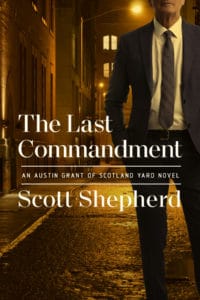I’ve spent the better part of three decades in a crammed room with up to a dozen other writers, attempting to come up with television episodes that once somewhat figured out, a particular scribe, or sometimes a “writing team”, will be sent off to turn said story into an outline, then a script. This place – usually drab, with a long conference table, reclining chairs, and walls covered by giant white boards waiting for flashes of brilliance—is commonly known as The Writers Room.
Once I started working on my novels, my days were spent in quite the different space– namely the office in my house– all by my lonesome. I like to think of this as A Writer’s Room.
What’s the difference? Besides the choice of article and a plural or possessive noun? In many instances, actually very little. But in other ways, like when deciding what time to set a scene, it’s night and day.
A few examples for your consideration.
IDEAS
In The Writers Room, there is no lack of them. If there are ten people at the table, you have to sort through at least that many, sometimes more because many writers cannot commit to one in particular. It takes a lot longer to go through them, but the advantage is you have a whole host of ideas to choose from. When running a television show, the challenge is to recognize the good from the bad.
In A Writer’s Room, ideas are often few and far between. Sometimes an entire day might go by where there isn’t one you want to entertain. But the good news is that once you land on one—you don’t have to have a protracted argument about it with others or put it up to a vote.
SOCIALIZATION
In The Writers Room, a good part of the day is spent filling in your fellow authors on what you did over the weekend, what restaurant you’ve been to, what show you’ve been streaming, or (most importantly) what you’re ordering for lunch. As a result, story progress is hindered more often than not, but sometimes a plot point or character suddenly emerges from these conversations that you’d never have dreamed up in your room staring at your blinking cursor.
In A Writer’s Room, there are no idle conversations. You don’t have to listen to half a dozen reviews of the same film or a play-by-play of last night’s Dodger game. You get to choose the music you play with no opposition and don’t have to punch a clock except in frustration when you can’t figure something out because there is no one around to bounce it off of.
PLOTTING
In The Writers Room, there are generally three or four story-lines in each episode, and you can break the room into teams, assign each one a different part of the plot. Therefore, you don’t have to come with the entire thing on your own. But you need to cross your fingers and toes that when you slam it all together it’s not a train wreck with plotlines crashing into one another.
In A Writer’s Room, you are the sole arbitrator of what happens—when, to who, and how. But it’s all on you, and as opposed to a possible collision somewhere down the tracks, you run the risk of the plot train never leaving the station.
REWRITING
In The Writers Room, especially when there’s a tight deadline, it is to have a fellow writer take a swing at a run of dialogue or rework a few scenes here or there. One of the first things you learn in television is that it’s a collaborative process—and if you’re working on script number four, it’s only as good as the three that came before it, so it really is The Dozen Musketeers.
In A Writer’s Room, there is no rewriting-by-committee. It’s just Little Ol’ You. There’s no question of Pride of Ownership. But there’s also only One Person to Blame.
TAKING A BREAK
In The Writers Room, the writing staff takes a half-hour recess in the morning and afternoon where one would be much better off taking a walk around the neighborhood or studio lot, but is usually spent hanging around the kitchen. It is there one finds so many unhealthy food choices that you end up having to work out that much more at night or on the weekend, and usually leads to a food coma where you lay down on the couch in your office just when you’re called back into the torture room for more plotting and trying to get a word in edgewise.
In A Writer’s Room, there is no craft service or catering. The fridge might only be steps away, but it only has whatever your spouse, significant other, roomie, or you left in it the night before. But there’s no fighting for the last Snickerdoodle cookie, and there’s a bed just down the hall to crash on—though you run the risk of sleeping through until the next morning when you have to start all over again.
HANK PHILLIPPI RYAN says: Any questions about the Writers Room? Let’s talk about it on the Career Authors Facebook page!
 Scott Shepherd is a veteran writer/producer/show-runner with years of experience running network series; his production and screenwriting credits include The Equalizer, Miami Vice, The Outer
Scott Shepherd is a veteran writer/producer/show-runner with years of experience running network series; his production and screenwriting credits include The Equalizer, Miami Vice, The Outer Limits, Haven, and Quantum Leap, and has overseen hundreds of hours of television, He has also collaborated with a number of best-selling novelists on various television projects including Stephen King, Harlan Coben and Karin Slaughter. Born in New York and raised in Los Angeles, he currently teaches television writing at the University of Texas in Austin.
Limits, Haven, and Quantum Leap, and has overseen hundreds of hours of television, He has also collaborated with a number of best-selling novelists on various television projects including Stephen King, Harlan Coben and Karin Slaughter. Born in New York and raised in Los Angeles, he currently teaches television writing at the University of Texas in Austin.
The Last Commandment is his first mystery novel. A Scotland Yard detective tracks a serial killer from London to New York City: Christmastime in London. When three seemingly unconnected victims are murdered with matching sequential Roman numerals carved into their foreheads, Metropolitan Police Commander Austin Grant finds his answer in one of the last places he’d expect: the Holy Bible. Each of the deaths correspond to a transgression of one of the Ten Commandments, and Grant must find the killer before the remaining Commandments are commemorated with homicides.





